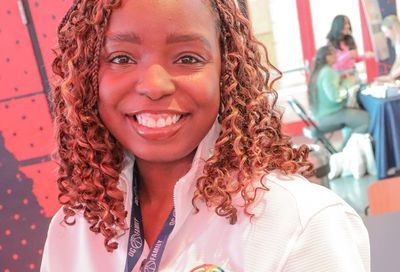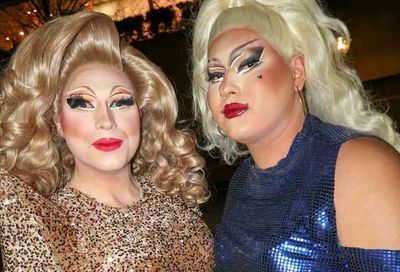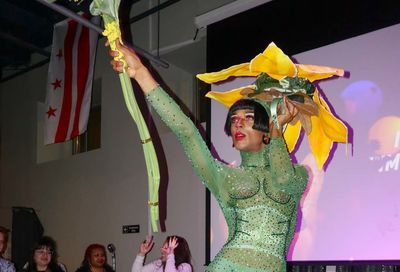Speaking in Mothertongues
Learning Curve
Last night I went to Mothertongue, which packed the Black Cat with over two hundred wild women, poets, and writers of every sexuality our fair city has to offer. It’s the place to be, if you hunger for progressive spoken/written word, and can dig the fire in the belly of the city’s alternababes.
I snagged the last available chair. Seated on the floor, resting against my right leg, was a cute young drag king; to my left, a former sex worker, the evening’s guest speaker.
|
To be a writer and gay, lesbian, and/or queer at the start of the 21st century is to live in the overlap of corporate publishing and little known ‘zines, to write about the body in ways many straight folks find unpoetic, however expressed. And the bloom is off the rose of radical lesbian lit: women’s bookstores like D.C.’s now-closed Lammas once showcased the mass wave of 1970s and ’80s authors before Borders, Crown and Barnes & Noble discovered the cliterati and remarketed gender studies. Now a few famous dyke-ademics get big reviews, but across the nation women’s bookstores are disappearing, vanishing, going the way of the saber-toothed tiger.
Newcomer writers have no place to push the work Hyperion won’t publish — or so I thought until, late in the 1990s, poetry slams and open-mikes emerged in the renaissance of coffeehouse culture, and gay writing took off again on caffeinated wings, serving up heaven and hell in barstooled dives.
Soon after I discovered poetry slams, I tried one and won fourth prize. I woke up in January 2000 and told myself to use that first year of the century to be a writer where I lived. That was the D.C. winter when a hot Jewish woman I’d met during the last gasp of Lammas bookstore, and a hot African-American woman I’d met at a debate about the Millennium March, both e-mailed me and asked if I’d help judge some poetry slam at Mothertongue. That was how I found my present beloved community — and learned how to keep warm in the winter.
My own first impressions when I walked into the Black Cat that frozen night of February 2000 were the hundreds of unbelievably attractive young poets in hip-hugger pants and pierced navels, lining up to read. Despite my twenty-five years in queer D.C., I knew almost no one in the room — many regulars are college age, and I was pushing forty.
But there I was, a “real” author, joining the tribe I had almost forgotten existed: young, loud, proud, better-than-Bohemians, taking up space like twice the babe I’d been myself at twenty-two, and everyone in the room was screaming as poet after poet stood up and read and laughed and yelled, and I slid off my chair and stopped being bored with anything ever again.
Each month, up to eighteen women get to read three pieces (or fill five minutes), and their prose and poems shout “Yes “: I am the woman, Jewish and black and Latina and mixed; I am the Native, invisible/seen; I am the foot on racism’s neck, I am the one they raped who lived, I am the young queer scene writ large. It’s the open-mike garden of Eden, and Adam discreetly tends the bar, Eve is in every line of spoken word, and all the fruit is luscious, ripe, split open by language. Where do they all come from, all these hip and curvy, scruffy, buffy girls with notebooks, printouts, tender pages clutched in sweating palms, silver rings on fingers, noses, arms? Red henna hair and dreadlocks tossed back from tight young faces, throats cleared: go. This is passion, written out by hand, memorized, delivered, in your face.
Month after month, I’ve never heard anyone bomb onstage, though half the readers hang their heads in shyness. I’m still in perfect awe of everyone; yet spreading the word brings mixed results from certain middle-aging pals. I once brought a friend whose nervous comment was “Whoa, young crowd.”
“But look, ” I reassured, “lots of over-thirties here. And if you are a writer, you’ll have an ageless hunger fed each month.”
Once I started getting up onstage and being the old dyke at the party every month, I sometimes had a line of my own students march in and sit down just before I launched into a fairly erotic piece. Fine. Let them know their professor gets laid. But still, seeing the same faces in class next day can bring a blush. Turn in your midterms, please, and oh, how did you like that seduction scene I read last night? But, damn it, it’s my city.
When I was in my twenties I did have a “scene” like this, if not so literary. From 1983 to 1991 I belonged to Herizon, a lesbian social club in Binghamton, New York. We had a bar and talent shows, and that was home for eight years of my life. When it closed I thought, “Never again. ”
But Mothertongue is different, and it’s home.
It’s home because it serves us in times of grief and ritual. I’ve seen this more than once: At the memorial tribute to the late Mothertongue emcee Heather Davis. After September 11th, 2001, when we all needed friends to hug, to hear our poems. I remember thinking, “Blessed is the writing community,” as beautiful young butches, girls and bois greeted each other softly, sighing. Everyone flipping through whatever ripped-out pages they had brought to read, grimly determined to live. There’s a sort of inward gasp when you see your community at its best, with noise and tears and sensuality right up to closing time.
It makes me plain delighted to be alive — to go beyond “I think, therefore I am,” to the action-packed “I am, and so, I slam.”
Bonnie J. Morris, Ph.D., is on the women’s studies faculty at George Washington University and Georgetown University. She can be reached at bmorris@metroweekly.net.
Support Metro Weekly’s Journalism
These are challenging times for news organizations. And yet it’s crucial we stay active and provide vital resources and information to both our local readers and the world. So won’t you please take a moment and consider supporting Metro Weekly with a membership? For as little as $5 a month, you can help ensure Metro Weekly magazine and MetroWeekly.com remain free, viable resources as we provide the best, most diverse, culturally-resonant LGBTQ coverage in both the D.C. region and around the world. Memberships come with exclusive perks and discounts, your own personal digital delivery of each week’s magazine (and an archive), access to our Member's Lounge when it launches this fall, and exclusive members-only items like Metro Weekly Membership Mugs and Tote Bags! Check out all our membership levels here and please join us today!



















